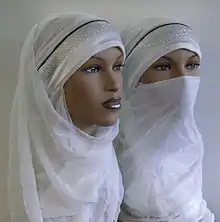World Hijab Day
World Hijab Day is an annual event founded by Nazma Khan in 2013.[1]Coincides with 1 February 1979 return of Ayatollah Khomeini to Iran and subsequent compulsion of Purdah.[2] The event takes place on 1 February each year in 140 countries worldwide.[3] Its stated purpose is to encourage women of all religions and backgrounds to wear and experience the hijab. Event organizers describe it as an opportunity for non-Muslim women to experience the hijab.[4]
| World Hijab Day | |
|---|---|
 World Hijab Day poster from 2016 | |
| Date(s) | 1 February |
| Frequency | Annual |
| Established | 2013 |
| Founder | Nazma Khan |
| Website | worldhijabday |
 |
| Part of a series on |
| Islamic female dress |
|---|
| Types |
| Practice and law by country |
| Concepts |
| Other |
Support
In 2017 New York State recognized World Hijab Day, and an event marking the day was hosted at the House of Commons , which was attended by Theresa May (former UK Prime Minister).[2] 2021 House of representatives of Philippines approved 1st February as 'annual national hijab day' to promote an understanding of the Muslim tradition.[5]
Criticism of the event
According to A. J. Caschetta choice of 1 February as event day is ironic since the same coincides with 1 February 1979 return of Ayatollah Khomeini to Iran from his French exile subsequent Iranian Islamic Revolution and enforcement of mandatory purdah and the covering of women.[2][6]Caschetta criticizes irony that while Hijab is being promoted in west as right to choose clothing which in most cases anyway exists but the same right to choice is not being fought for persecuted women who are disinclined or reject and refuse to wear Hijab.[6]
In February 2013, Maryam Namazie criticised World Hijab Day in a piece that compared World Hijab Day with World Female Genital Mutilation Day or World Child Marriage Day. She was quoted in a BBC report on the Day as saying:
"Millions of women and girls have been harassed, fined, intimidated and arrested for 'improper' veiling over the past several decades," she wrote in a blog post about the Iranian women's football team's hijabs.
"Anyone who has ever taken an Iran Air flight will verify how quickly veils are removed the minute the airplane leaves Iranian airspace.
"And anyone who knows anything about Iran knows the long and hard struggle that has taken place against compulsory veiling and sex apartheid."
In 2014, Maryam Namazie called for solidarity with "women who refuse and resist veiling."
In December 2015, The Washington Post published an opinion piece by Asra Nomani and Hala Arafa titled "As Muslim women, we actually ask you not to wear the hijab in the name of interfaith solidarity".[7] They say that the event spreads the "misleading interpretation" that the head covering is always worn voluntarily, and that "hijab" purely means headscarf.
In his own opinion piece published in 2017, Maajid Nawaz references the earlier Nomani & Arafa article and describes the event as "worse than passé", suggesting that the name be changed to "Hijab is a Choice Day".[8]
In 2018, Canadian human-rights campaigner Yasmine Mohammed started a #NoHijabDay campaign in response, to celebrate the women who have defied social censure and the state to remove the hijab.[9] She says:
No Hijab Day is a day to support brave women across the globe who want to be free from the hijab. Women who want to decide for themselves what to wear or what not to wear on their heads. Women who fight against either misogynist governments that will imprison them for removing their hijab or against abusive families and communities that will ostracize, abuse and even kill them.[10]
Social media debate
World Hijab Day and No Hijab Day both are largely influenced through social media. World Hijab Day campaigners promote day with hashtags like #EmpoweredinHijab. The other 'No Hijab Day' camp urges women to stay away from Hijab since it is not necessarily free choice for many women in the real sense.[2]
See also
Notes
- "World Hijab Day - Better Awareness. Greater Understanding. Peaceful World". Archived from the original on 6 October 2016. Retrieved 13 September 2016.
- Grewal, Kairvy (31 January 2020). "On World Hijab Day, women across the globe are polarised". ThePrint. Retrieved 1 February 2021.
- Participating Countries. "Worldwide Support". World Hijab Day. Archived from the original on 10 March 2016. Retrieved 6 March 2016.
- "World Hijab Day". Facebook.com. Archived from the original on 26 July 2016. Retrieved 6 March 2016.
- "House OKs bill declaring National Hijab Day". The Manila Times. Retrieved 1 February 2021.
- Caschetta, A. J. (30 January 2020). "The Irony and Hypocrisy of World Hijab Day". National Review. Retrieved 1 February 2021.
- "As Muslim women, we actually ask you not to wear the hijab in the name of interfaith solidarity". The Washington Post. 21 December 2015. Archived from the original on 21 December 2015. Retrieved 19 July 2019.
- Maajid Nawaz. "The Great Hypocritical Muslim Cover-Up". The Daily Beast. Archived from the original on 5 March 2016. Retrieved 6 March 2016.
- "'Removing your hijab can get you killed – even in the West'". spiked. Archived from the original on 2 February 2019. Retrieved 2 February 2019.
- Mohammed, Yasmine. "Support Muslim women in fight against hijab". Toronto Sun. Archived from the original on 2 February 2019. Retrieved 2 February 2019.
References
- Grima, Nathalie. "An Affair of the Heart": Hijab Narratives of Arab Muslim Women in Malta." Implicit Religion 16, no. 4 (December 2013): 461-481. Academic Search Complete, EBSCOhost.
- Jones, Nicky. "Beneath the Veil: Muslim Girld and Islamic Headscarves in Secular France." Macquarie Law Journal 9, (May 2009): 47-69. Academic Search Complete,EBSCOhost.
- Prusher, Ilene. "World Hijab Day: Muslims debate where the headscarf belongs." Christian Science Monitor, 4 September 2012. N.PAG, Academic Search Complete, EBSCOhost
- Vyas, Sapna. "Identity Experiences of Young Muslim American Women in the Post 9/11 Era " Encounter 21, no. 2 (Summer2008 2008): 15-19. Academic Search Complete, EBSCOhost.
- ZAHEDI, ASHRAF. "Muslim American Women in the Post-11 September Era." International Feminist Journal of Politics 13, no. 2 (June 2011): 183-203. Academic Search Complete, EBSCOhost.
- "Participating Countries - World Hijab Day." World Hijab Day. N.p., n.d. Web. 5 March 2016.
- "Assemblyman David Weprin issues statement in support of ‘World Hijab Day’", 1 February 2016. http://worldhijabday.com/assemblyman-david-weprin-issues-statement-in-support-of-world-hijab-day/